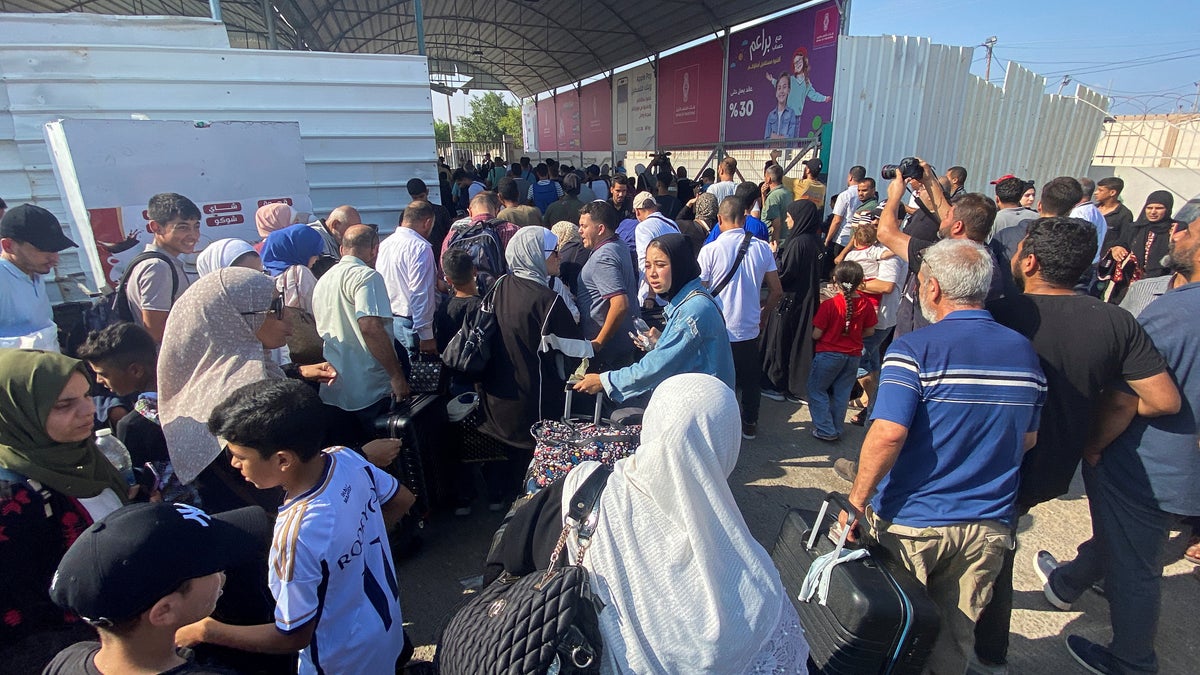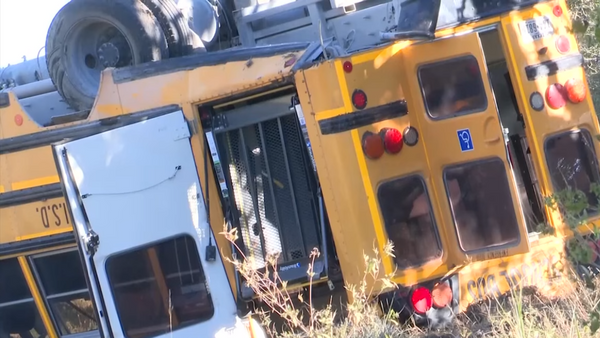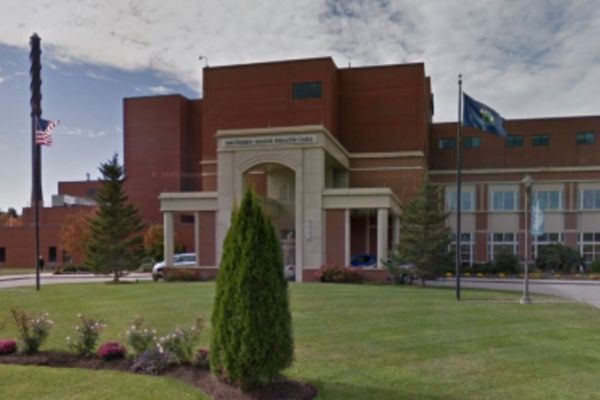
The first British citizens have escaped Gaza as the Rafah crossing opened for the first time since the start of the war, but many more have been turned away in chaotic scenes where desperate families begged border guards to be allowed to cross to safety.
Under heavy bombardment, families scrambled to the Rafah Crossing – some on donkey carts – after Egypt started to let through a limited number of foreign citizens and critically injured for the first time since Israel launched a ferocious bombing campaign on 7 October.
But just 320 foreign passport holders and dozens of severely injured Palestinians were allowed through, according to local sources. The Independent understands at least two of them were British citizens who worked for international aid organisations. There are believed to be 200 British citizens inside the bombarded strip.
Asked if British nationals would be getting out of Gaza in the current “wave” of crossings at Rafah, Mr Sunak told ITV’s Peston programme: “We are hopeful that we’ve made some progress. It’s something that we have pushed on repeatedly with all partners. You know, hopefully, we will now start to see that … we’ll do everything we can to get them out, including hostages as well.”
Few knew who was on the lists, as Gaza was plunged into a second communications blackout overnight when phone and internet lines were cut.
When British citizens who made the fraught journey reached the border, they described “panicked” crowds clutched around A4 lists of names, mothers trying to secure passage for the children, and families, who had no means of going home, setting up camp outside the gates.
“We got a text from the Foreign Office saying Rafah might be opened. In the morning we had no phone signal so we didn’t know what was going on,” said Mohamed Ghalayni, a British-Palestinain air quality scientist who was visiting family when the war started.
The Manchester resident said he was told in a message by the FCDO that “limited exits” would take place on Wednesday, “primarily for seriously wounded Palestinians and a first group of foreign nationals”. The text did not specify which British citizens could cross.
Palestinians with dual citizenship wait at the Rafah border crossing— (Reuters)
He used the last dregs of precious fuel supplies to drive to the border to see if he or any family members would be allowed to leave. When he got there only his uncles – who are Jordanian citizens – were among those included.
“The situation was desperate there. People are really afraid. Whoever can leave is trying to leave,” he said.
“People are travelling to the border on whatever means they can, some people arrived on donkey carts because no fuel is available.”
Qassim El-Farra, 21, a British biomedical science student and cousin of Mr Ghalanyni also tried to exit. He said people had bought blankets and planned to sleep at the crossing to wait until they could leave, while others tried to convince border guards to add their names to the list.
“Many came just to chase the hope of trying to leave. People were crammed in tiny crowds trying to see if their name is on A4 pieces of paper which were flapping off the wall,” the Manchester Metropolitan University student told The Independent.
“In the actual building people were ... trying to convince guards to add their name to the list. The guards were urging people to stop causing commotion and to take their seats otherwise they will not continue letting people through.
“I also lost hope as a British national not on the list and left to go back home to try again another day.”
Foreign secretary James Cleverly said UK teams are “ready to assist British nationals as soon as they are able to leave”.
Palestinians with dual citizenship walk at the Rafah border crossing with Egypt in the hope they can leave— (Reuters)
The Foreign Office added: “We have been working at every level of government to ensure the Rafah crossing could open and allow all British nationals to leave Gaza.”
Israel has launched its heaviest-ever bombardment of Gaza and imposed a crippling total siege in retaliation for the 7 October massacre, when Hamas militants killed hundreds of people and took dozens, including British citizens, hostage.
The health ministry in Hamas-run Gaza says more than 8,700 Palestinians, including 3,648 children, have been killed in the onslaught, nearly four times the death toll from the seven-week war between Israel and Hamas in 2014.
Among the casualties are hundreds who were killed and wounded in an Israeli strike on Gaza’s largest refugee camp, Jabalia, on Tuesday afternoon.
The Israeli military said the bombing, which is believed to have destroyed over a dozen homes, killed Hamas commander Ibrahim Biari who allegedly orchestrated part of the 7 October attack. The camp was bombed again on Wednesday.
The United Nations said on Wednesday it had “serious concerns” that the “disproportionate attacks” on the camp could amount to war crimes due to the high number of casualties and scale of the destruction.
Doctors treating those injured in the two Jabalia strikes told The Independent they have been forced to operate without anaesthetic and are using washing liquid to clean wounds.
Dr Marwan al-Sultan, director of the Indonesian hospital where most of the wounded were taken, said fuel supplies were so low they would shut down power to some wards on Wednesday night. “Most of the cases need intensive care unit but right now we have critical shortages in fuel.
“Within a few hours we will announce we are stopping the operative theatre and will only run the emergency departments to save lives,” he added.
Israeli military officials told The Independent on Wednesday that Hamas militants had fuel and could deliver it to hospitals but had chosen not to.
A man gestures as Palestinians search for casualties a day after Israeli strikes on houses in Jabalia refugee camp— (Reuters)
In a briefing they said that Hamas was exaggerating the humanitarian crisis – insisting there is enough water and food in the strip. “They want this picture of destruction,” said Rear Admiral Daniel Hagari, international spokesperson.
“There is no lack of food in Gaza, there are plenty of supplies,” another officer said. However, the United Nations has repeatedly called for a humanitarian ceasefire as the healthcare system has collapsed.
The UN’s child agency Unicef said “Gaza has become a graveyard for children” and “it’s a living hell for everyone else.”
Mr Ghalayni said that “day-to-day existence is really really difficult” in Gaza, with fuel supplies nearly exhausted, water running out and food becoming increasingly expensive and difficult to buy in the shops.
“It imperative on the UK and the US, who have the power, to use that power responsibly and stop Israel from this madness and committing further atrocities,” he said.
Mr el-Farra said that families did not want to leave their homes but had to for “the sake of their kids’ safety – they are leaving behind a piece of their heart and culture. If people don’t leave they fear death”.







